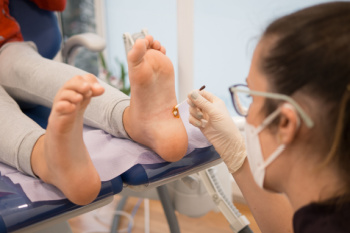
Plantar warts, medically termed Verruca plantaris, are common skin growths caused by the human papillomavirus, or HPV. These warts typically appear on the soles of the feet, often in areas subjected to pressure or friction, such as the heels or balls of the feet. Plantar warts often manifest as small, rough, grainy lesions with black dots, or wart seeds, scattered throughout. These black dots are actually tiny blood vessels. While plantar warts are usually harmless, they can cause discomfort or pain, especially when walking or standing. The HPV virus enters the body through small cuts or breaks in the skin, making individuals who frequently walk barefoot in communal areas more susceptible to infection. Treatment options for plantar warts range from remedies like salicylic acid patches or freezing kits to medical procedures performed by podiatrists. Seeking prompt treatment is essential to alleviate symptoms and prevent the spread of plantar warts to other areas of the feet or other individuals. If you have a plantar wart, it is suggested that you schedule an appointment with a podiatrist who can offer the best treatment option for you.
Plantar warts can be very uncomfortable. If you need your feet checked, contact one of our podiatrists from Toe-Tal Family Foot & Wound Care Professionals . Our doctors will assist you with all of your foot and ankle needs.
About Plantar Warts
Plantar warts are the result of HPV, or human papillomavirus, getting into open wounds on the feet. They are mostly found on the heels or balls of the feet.
While plantar warts are generally harmless, those experiencing excessive pain or those suffering from diabetes or a compromised immune system require immediate medical care. Plantar warts are easily diagnosed, usually through scraping off a bit of rough skin or by getting a biopsy.
Symptoms
- Lesions on the bottom of your feet, usually rough and grainy
- Hard or thick callused spots
- Wart seeds, which are small clotted blood vessels that look like little black spots
- Pain, discomfort, or tenderness of your feet when walking or standing
Treatment
- Freezing
- Electric tool removal
- Laser Treatment
- Topical Creams (prescription only)
- Over-the-counter medications
To help prevent developing plantar warts, avoid walking barefoot over abrasive surfaces that can cause cuts or wounds for HPV to get into. Avoiding direct contact with other warts, as well as not picking or rubbing existing warts, can help prevent the further spread of plantar warts. However, if you think you have developed plantar warts, speak to your podiatrist. He or she can diagnose the warts on your feet and recommend the appropriate treatment options.
If you have any questions please feel free to contact our office located in Vista, CA and Las Vegas, NV . We offer the newest diagnostic and treatment technologies for all your foot and ankle needs.
